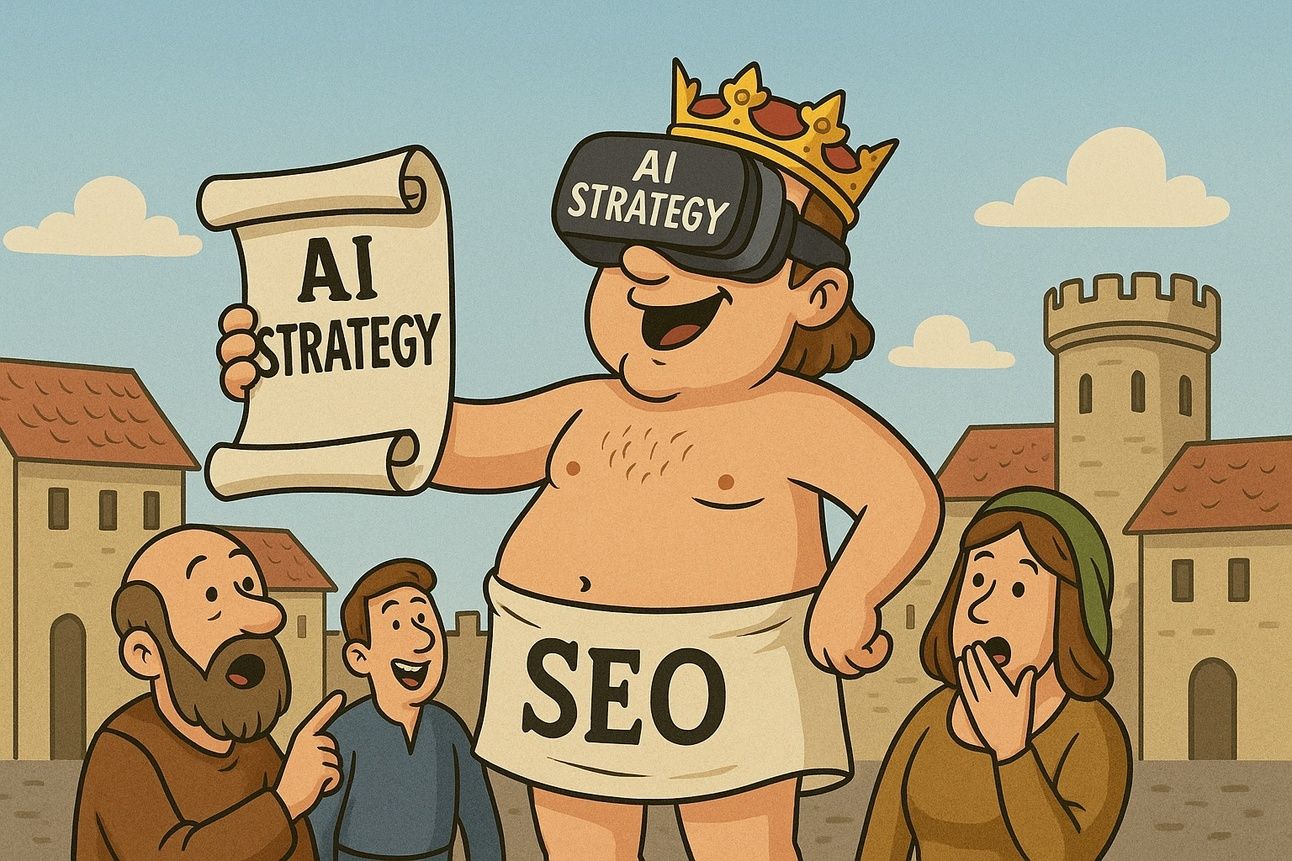I attended an SEO presentation last week where an agency presented their "AI-powered discoverability solution." The presentation was slick, the terminology cutting-edge, and the promises transformative. But as I listened to their "revolutionary" strategy checklist, I couldn't shake the feeling I'd heard this exact presentation before—about fifteen years ago, when it was called SEO.
The legal industry is currently mesmerized by AI's potential to transform client discovery. Everyone from directory providers to marketing consultants are positioning themselves as essential guides to this brave new world. But here's what I've observed after working with hundreds of law firms on their SEO strategies: most of what's being sold as AI innovation is actually traditional SEO best practices with a fresh coat of artificial intelligence paint.
Before dismissing this as cynical contrarianism, let me be clear: I'm not suggesting that all AI-focused marketing services lack value. Some vendors are genuinely innovating, and AI is creating legitimate changes in how people search for and consume information. But the majority of what I'm seeing in the legal marketing space represents repackaging rather than revolution.
When "AI Strategy" Sounds Suspiciously Like 2010
Let me walk you through what I'm seeing in these "AI-readiness" proposals and why they seem so familiar:
The "Meticulous Directory Submission" Revelation
The latest advice emphasizes creating "detailed, evidence-backed summaries" for directory submissions and prominently displaying those shiny badges across your website. Consultants breathlessly explain how this reinforces "E-E-A-T signals" for AI systems.
I remember having this exact conversation with clients in 2012. Back then, we called it "authority building" and "leveraging third-party validation." The tactics haven't changed—we've just added "for AI" to the end of every sentence. Directories have always been about credibility transfer; now we're pretending AI invented the concept.
The Schema Markup "Innovation"
Now, every AI consultant is pushing schema markup as the secret sauce for AI visibility. Attorney schema, LegalService markup, structured Q&A content—all presented as cutting-edge AI optimization.
Here's the thing: I've been implementing schema markup for law firms since Google started supporting it. The value proposition was identical then—make your content machine-readable so algorithms can understand and surface it better. The only thing that's changed is we now say "AI models" instead of "search engines."
The Q&A Content "Breakthrough"
The newest trend involves structuring content in question-and-answer format to optimize for "conversational AI search." Firms are told to create comprehensive attorney bios with detailed achievements and publications.
This is literally what I was teaching firms to do for featured snippets five years ago. Q&A format has always aligned with how people search for information—whether they're typing into Google or asking an AI chatbot. We're not discovering new user behavior; we're just describing the same behavior with different technology.
The "AI-Essential" Local SEO Package
Now consultants are selling NAP consistency, Google Business Profile optimization, and review management as crucial "AI trust signals."
I've been preaching these local SEO fundamentals since Google Places existed. The only difference in the sales pitch now is that it includes phrases like "AI systems require consistent data" instead of "search algorithms need accurate information."
What's Really Happening: AI Relies on Existing Authority
The most revealing part of this entire phenomenon is how AI actually works. Here's what nobody wants to admit:
AI systems overwhelmingly prioritize content from websites that already rank well in traditional search. When Chambers and Legal 500 show up in AI responses, it's not because AI has some magical new way of evaluating legal expertise—it's because these directories have spent decades building the exact signals (high domain authority, quality backlinks, structured content) that any algorithm uses to determine credibility.
In other words, AI isn't creating new rules for authority. It's inheriting and amplifying the authority you've already built through effective SEO.
This doesn't mean AI changes nothing about search behavior. Conversational interfaces like ChatGPT and voice assistants are shifting how people frame questions and expect answers. But the underlying authority signals that determine which sources get surfaced remain remarkably consistent with traditional search ranking factors.
The Data Doesn't Lie: It's Still SEO at Its Core
Here's the evidence that exposes the repackaging: research shows that 99% of sources cited in Google's AI answers were also top-10 organic search results.
Think about what that means. AI isn't discovering some new universe of authoritative content. It's synthesizing and re-presenting the same websites that already dominate traditional search. If your content ranks well organically, AI will likely reference it. If it doesn't, AI probably won't find it either.
The "AI optimization" industry is built on a fundamental misconception about how these systems actually work.
Why the Repackaging Matters
I'm not arguing that AI doesn't change anything—it absolutely does. The way people consume information is evolving, and firms need to adapt. But here is what concerns me about the current "AI strategy" industry:
Firms are paying premium prices for "revolutionary" AI optimization that's actually just competent SEO work with trendy terminology. Meanwhile, they're often neglecting the foundational work that would genuinely improve their visibility in both traditional search and AI responses.
The vendors pushing "AI-specific" strategies often can't explain why their recommendations differ meaningfully from good SEO practices, because in many cases, they don't.
The Competitive Reality Check
This creates a strategic dilemma for firms. If competitors are investing heavily in "AI optimization," should you follow suit?
Here's how to think about it: ask vendors specific questions about what makes their approach different from traditional SEO. Request data showing improved performance specifically attributable to AI-focused tactics rather than general SEO improvements. And most importantly, ensure any "AI optimization" investment still delivers value even if the AI terminology proves to be mere marketing speak.
Evaluating Vendor Claims
When evaluating AI optimization services, ask these questions:
Can you explain specifically how your AI recommendations differ from traditional SEO best practices?
What measurement methodology distinguishes AI-driven traffic from organic search traffic?
Can you provide case studies where AI-specific tactics outperformed traditional SEO approaches?
How do you account for the 99% overlap between AI citations and top organic search results?
If vendors can't provide clear answers, you're likely looking at repackaged SEO services at premium prices.
"This measurement challenge isn't unique to AI marketing. As SEO expert Kevin Indig notes: 'Everything starts with a goal. Most startups just want more organic traffic, but that doesn't cut it. More traffic is not a goal; +30% conversion from organic traffic YoY is.'
The same principle applies to AI optimization—vague promises of 'better visibility' or 'improved rankings' aren't sufficient. You need vendors who can articulate specific, measurable outcomes that justify their premium pricing."
The Psychology Behind the Repackaging
Why is this repackaging so pervasive? After speaking with dozens of vendors over the past year, I believe most aren't being deliberately deceptive. They're genuinely confused about the difference between AI-enabled SEO and AI-native marketing innovation.
The confusion stems from a fundamental misunderstanding of how AI systems actually work. Many vendors assume that because AI can generate content or analyze data, it must be creating fundamentally new optimization strategies. But AI systems are pattern recognition engines—they excel at identifying what already works and scaling it, not at inventing entirely new approaches.
This creates a challenging situation. Vendors believe they're innovating, clients want to believe in revolutionary solutions, and an industry that rewards new terminology over new value. The result is a market flooded with "AI optimization" services that are, at their core, competent SEO execution with inflated expectations.
The Strategic Implications: Why This Matters More Than You Realize
This repackaging creates three significant problems that extend beyond wasted marketing budgets:
First, it obscures genuine AI innovation. When everything is labeled "AI optimization," it becomes harder to identify the vendors who are actually building something new versus those repackaging existing services.
Second, it sets unrealistic expectations. Firms investing in "revolutionary AI marketing" expect revolutionary results. When they get incremental improvements from good SEO work, they conclude that AI marketing doesn't work—missing opportunities for legitimate AI applications.
Third, it creates strategic blind spots. Firms focused on "AI optimization" often neglect the foundational SEO work that would actually improve their visibility in both traditional search and AI responses.
The Real AI Strategy: Focus on SEO Fundamentals
Here's my contrarian take: the best AI optimization strategy for most law firms is to execute traditional SEO effectively.
Focus on creating genuinely helpful content that demonstrates expertise. Build real authority through quality work and authentic third-party validation. Ensure your technical implementation is solid and your local presence is consistent. These fundamentals will serve you in both traditional search and whatever AI-powered discovery that emerges.
The Hybrid Approach
This doesn't mean completely ignoring AI developments. A balanced approach might include:
Monitoring how AI systems surface your existing content
Experimenting with conversational content formats that naturally answer questions
Testing schema markup implementations specifically for voice and AI search
Tracking performance across both traditional search and AI platforms
But these tactics should complement, not replace, fundamental SEO work.
The firms that will thrive in an AI world aren't those chasing the latest "AI optimization" trends. They're the ones that built strong digital foundations years ago and continue to execute the basics at a high level.
AI might be changing how people find information, but it's not changing what makes information worth finding. Until someone can show me data proving that AI requires fundamentally different optimization strategies than good SEO, I'm going to keep calling this trend what it is: old wine in new bottles.

The Uncomfortable Truth About Legal Marketing's Future
Here's what nobody wants to say out loud: the legal SEO agencies are desperately trying to justify their existence in an AI world by rebranding everything they already do as "AI optimization." This isn't innovation—it's self-preservation disguised as revolution.
The firms that fall for this repackaging aren't just wasting money; they're falling behind competitors who understand that AI's real value lies in amplifying good fundamentals, not replacing them with magic bullets. While you're paying premium prices for "AI-powered directory optimization," your competitors are using actual AI tools to create better content, understand their audiences more deeply, and automate the tedious work that frees their teams to focus on strategy.
The next two years will separate the firms that bought into the hype from those that built on solid foundations. When the "AI optimization" bubble bursts—and it will—the firms still standing will be those that never confused marketing terminology with marketing strategy.
The fundamental challenge facing law firms today isn't choosing between AI optimization and traditional SEO. It's developing the courage to call bullshit on expensive solutions that don't solve real problems. The firms that succeed will be those willing to look past the marketing terminology to understand what actually drives authority and visibility in an increasingly complex digital landscape.
Your analytical skills didn't abandon you when you became a client instead of an advocate. Question vendor claims, demand specific evidence, and always ask whether a proposed solution addresses a real problem or simply exploits market anxiety about being left behind.
Most importantly, remember that no algorithm—whether we call it search, AI, or something else entirely—can manufacture authority where none exists. The best "AI strategy" remains what it's always been: demonstrating genuine expertise, serving clients exceptionally well, and building trust through consistent, valuable communication. Everything else is a costly distraction.


